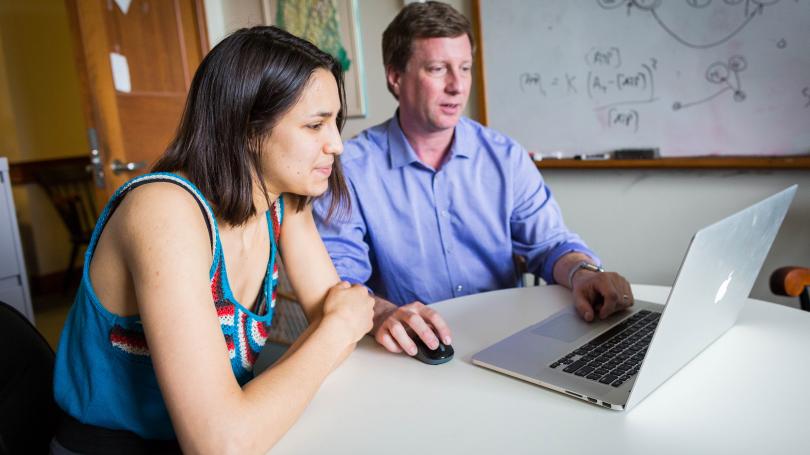
Menu
- About
- Mentoring
- Research
- Faculty
- News & Events
Back to Top Nav
Back to Top Nav
Back to Top Nav
Back to Top Nav
Irina Shlosman '16 knows better than most how different college can be from high school.
The native of Moscow, Russia, went to a special high school where she studied the humanities almost exclusively. Her studies focused on languages, literature, and history, and she had very little experience in the sciences. But at Dartmouth, Shlosman challenged herself to study the sciences and eventually found a home in the chemistry department.
A biophysical chemistry major, Shlosman started her career in scientific research as a research assistant in the fall of her first year at the College. Later that term, Shlosman attended pre-health and STEM information sessions and applied for the Women in Science Project (WISP). She was soon accepted as a WISP research intern in the lab of Rebecca Irwin, an associate professor of biological sciences. Under Irwin's guidance, Shlosman worked on a project studying bee behavior and the various factors affecting nectar collection.
While Shlosman found the project interesting, she soon realized that she was more interested in chemistry than biology. "Chemistry requires a quantitative approach where you have to go to a deep level of detail to try and piece everything together," says Shlosman. After her WISP internship she accepted a position as a research assistant with F. Jon Kull '88, the Rodgers Professor of Chemistry and the dean of Graduate Studies.
"Irina combines the best qualities of a great scholar: keen intellect, a curious mind, passion for learning, and great motivation to succeed," says Kull. "What is most impressive is that Irina has the intellect, the curiosity, and the drive to figure out how to overcome research roadblocks. While I might expect this from an advanced graduate student, to have this level of scientific investigation demonstrated by an undergraduate is exceptional."
Shlosman has worked in Kull's lab since her sophomore year, participating in many different projects. She started her first independent project at the end of her junior year, which evolved into her senior thesis. The project focused on the structural and functional characterization of a protein called VirF in an organism called Yersinia enterocolitica—a bacterium similar to Vibrio cholerae and in the same family as the bubonic plague.
Scientific research is Shlosman's passion. "It's like a love affair, you have to love the whole thing," she says. "I think it's almost a way of life, or a way of thinking, and once you get into it it's not a career—it's a calling."
In addition to her thesis, Shlosman was also involved in a research project with professors Robert Cantor and Dale Mierke of the chemistry department. In this collaboration, Shlosman worked with Maria Pellegrini, research associate professor of chemistry, employing nuclear magnetic resonance spectroscopy to study the kinetics of isoflurane binding to lipid bilayers.
Shlosman says WISP is a great resource in helping students prepare for more involved research positions later on in their Dartmouth careers. She encourages students to take their time to explore different STEM classes before deciding on a research project or a major. "Do not approach research flippantly, or assume that every project will be beneficial to your development," Shlosman says. "Just as professors are selective, so must you be selective because it is about your future. It is about your passion."
Shlosman will attend a two-year post-baccalaureate program doing research in a biophysical chemistry lab for the National Institutes of Health. She hopes to later pursue a graduate degree in chemistry.
The Women in Science Project was co-founded in 1990 by Carol Muller '77, former associate dean for administration at Dartmouth's Thayer School of Engineering, and the late Karen E. Wetterhahn, professor of chemistry and associate dean for the sciences. The program helps create an environment where women can thrive in science, technology, engineering, and mathematics. The program, which is celebrating its 25th anniversary this year, has received numerous accolades and is replicated on college campuses nationwide.
The Web Services Student Content Corps is an experiential learning program designed to give students professional work experience in digital content creation. Content Corps members work under the guidance of the Web Services team to produce content for department and program websites.